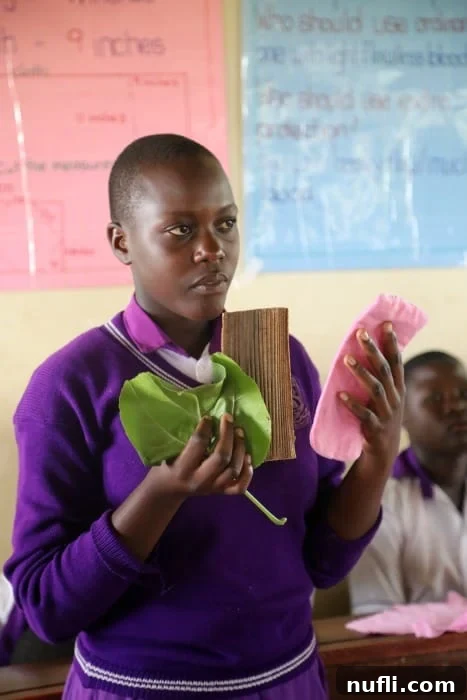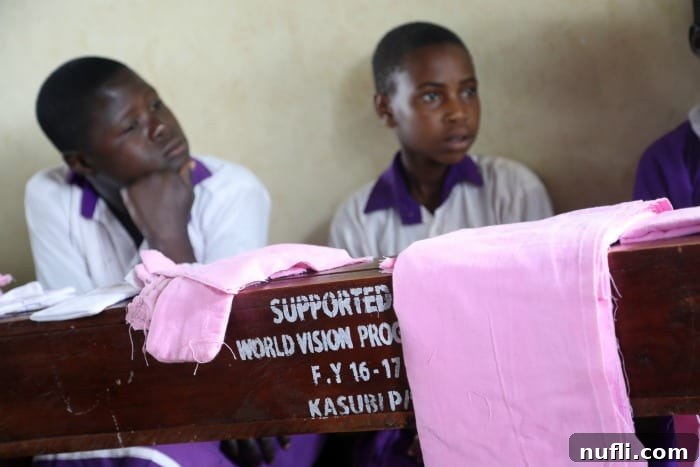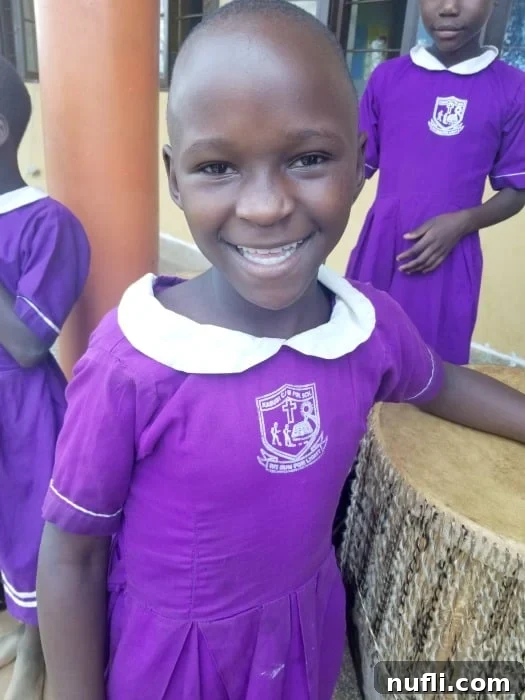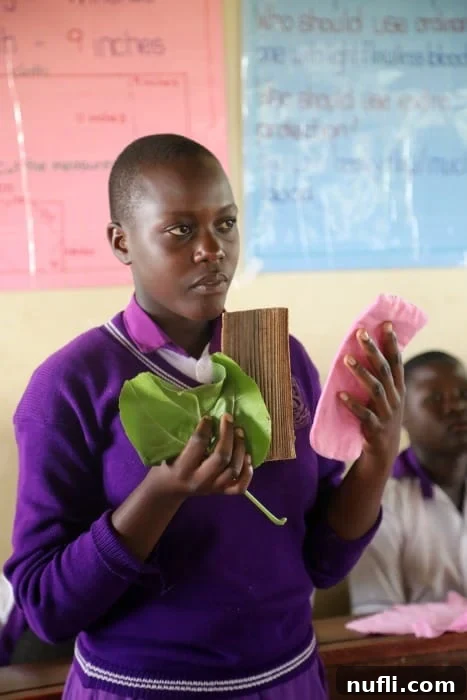In a world where comfort and convenience often dictate our daily routines, it’s easy to overlook the fundamental challenges many face. Just a month ago, a routine biological event for me — the start of my period — served as a powerful reminder of a vastly different reality I encountered in Uganda. While my experience there was simply an inconvenience, effortlessly managed with readily available supplies, it shone a spotlight on a pervasive issue that profoundly impacts the lives of countless young girls across the globe: period poverty. For me, menstruation was a minor footnote in an unforgettable journey; for them, it’s a barrier to education, dignity, and a brighter future. This stark contrast ignited a deep reflection on privilege and the silent battles fought by many.
Our journey in Uganda began not with breathtaking landscapes, but with a visit to a vibrant primary school, where we were introduced to an extraordinary group: a life skills club. This wasn’t just any club; it was a beacon of hope, comprised of both spirited girls and determined boys working collaboratively to ensure their friends, sisters, and classmates could stay in school. The question that immediately arises for many is, why would fellow students need to form a club specifically to address school attendance? The heartbreakingly simple answer lies in the onset of menstruation. For young girls in many parts of Uganda, starting their period means missing multiple days of school each month, gradually eroding their chances of a meaningful education.
The implications of this absence extend far beyond missed lessons. When girls are forced to stay home during their periods, they become disproportionately vulnerable to a myriad of dangers. The protective environment of the school gives way to heightened risks of abduction, forced labor, and sexual violence. Each day away from the classroom chips away at their academic progress, making it incredibly difficult to keep pace with their studies, let alone pursue higher education or career aspirations. A natural, healthy monthly cycle, a universal experience for women, becomes an insurmountable obstacle, effectively robbing these young girls of their education and their fundamental right to a safe, empowering future. This cycle of missed schooling perpetuates gender inequality and limits opportunities for entire communities, making menstrual hygiene a critical issue for social and economic development.
Before the intervention of this vital life skills class, the lengths to which these girls went to manage their periods were truly heartbreaking. We learned that they resorted to using whatever makeshift materials they could find – scraps of cardboard, dried banana leaves, torn pieces of toilet paper, or any random paper – desperately attempting to create some form of sanitary protection. These crude methods offered little comfort or hygiene, often leading to infections, discomfort, and immense embarrassment, ultimately driving them away from school. Recognizing this urgent need, World Vision, through its dedicated and expertly trained school staff, collaborated with the club members. They introduced a transformative solution: teaching the students how to craft reusable sanitary pads using readily available, affordable, and sustainable local materials. This initiative wasn’t just about providing pads; it was about restoring dignity, promoting health, and ensuring consistent school attendance.

Empowering Girls: How a Life Skills Club is Transforming Education in Uganda
The life skills club is at the heart of this transformative movement, demonstrating the profound impact that community-led initiatives can have on critical issues like period poverty and girls’ education in Uganda. This inspiring co-ed group, composed of bright and dedicated children, convenes at least once a week, often more, dedicating their time and effort to hand-sew reusable pads for all the girls in their school. During our visit, they eagerly walked us through each intricate step of the pad-making process, from cutting fabric to stitching the layers together. Their enthusiasm was palpable, and their explanations of why this work was so vital were incredibly moving. One young man, with a sincerity that touched everyone, expressed his primary motivation: he wants nothing more than to ensure his sisters, and all the girls, have the same opportunity to stay in school, learn, and achieve their dreams, free from the burden of menstrual shame and discomfort.

The club’s curriculum extends far beyond practical sewing skills. It encompasses comprehensive education on menstrual health and hygiene, empowering girls with knowledge about their bodies and how to properly care for their reusable pads, ensuring cleanliness and longevity. This education is crucial for maintaining their health and confidence. Equally important, the boys in the club are actively engaged in learning to be more empathetic and supportive towards their female classmates. They gain a deeper understanding that menstruation is a natural biological process, not something to be shamed or hidden. This fosters a supportive and inclusive school environment, breaking down harmful stigmas and building a culture of mutual respect regarding menstrual health.
The sheer joy and pride radiating from the children we met in this life skills club were infectious. Their faces lit up with huge smiles as they spoke about their contributions, driven by a genuine desire to help their fellow classmates remain in school. Witnessing their dedication, it was clear this was more than just a task; it was a mission. However, we also learned about the challenges they face. Currently, every single pad is meticulously hand-stitched, a process that, while imbued with care, is incredibly time-consuming. They shared their aspirations, a collective dream of acquiring three sewing machines for the school. These machines would dramatically accelerate the production process, allowing them to create significantly more reusable pads and, in turn, extend their reach to support an even greater number of girls in school, thereby amplifying their impact on the community.

Standing there, hearing their heartfelt dream, a wave of familiar urgency washed over me. Like many, my immediate thought was, “How can I personally make this happen? How do I send those three sewing machines to Uganda?” My mind raced through logistics – could I simply Amazon Prime them to the school? Or perhaps a direct financial contribution? What I’ve come to understand, however, is the profound effectiveness of a more integrated and sustainable approach. Through sponsoring a child with World Vision, the monthly contributions don’t just reach an individual; they are strategically channeled to support a wide array of community-led development projects, including vital initiatives like this life skills club. This holistic method ensures long-term impact, addressing root causes rather than just symptoms, and empowering communities to drive their own progress.
Another common question that naturally arises, and one that initially crossed my own mind, is why a large tampon or pad company wouldn’t simply send massive crates of disposable supplies to address the need. While seemingly intuitive, my experience in Uganda quickly revealed the logistical and environmental impracticalities of such a solution. Sustaining a long-term supply chain of disposable products to remote areas is fraught with challenges, from import duties and customs to distribution networks and ensuring consistent availability. Beyond logistics, these products generate significant amounts of additional waste, which schools and local communities in Uganda are simply not equipped to handle responsibly. A surge in non-biodegradable waste would create a new set of environmental and health problems, undermining the very goal of improving living conditions.
This is precisely where the genius of the reusable pad initiative shines. By teaching girls and their classmates to make and properly use reusable pads, they are not just providing a temporary fix; they are creating a truly sustainable, long-term answer to period poverty. This empowers the community to be self-sufficient, reducing reliance on external aid and fluctuating supply chains. The skills learned are invaluable, enabling them to continue producing pads for themselves and their peers, and critically, to pass these essential sewing and hygiene skills down to younger generations. This knowledge transfer ensures the project’s legacy endures, fostering continuous empowerment and breaking the cycle of missed education for countless girls in the years to come, strengthening community resilience and promoting local entrepreneurship.
Rest assured, the desire to help secure those three sewing machines remains a priority for me, and I am still actively exploring the most effective and sustainable ways to get them to the school. It’s natural to sometimes feel that our individual contributions might be just a “drop of water in an ocean of need,” especially when confronting such vast global challenges. However, it’s crucial to remember that every single drop contributes to the ocean’s immense power. The consistent, collective donations we make each month, particularly through reputable organizations like World Vision, truly do create ripples of change. These funds fuel critical projects on the ground, enabling real and tangible differences in the lives of vulnerable children and their communities, transforming seemingly small acts into monumental impacts.
The daily impact of this life skills class on its students and the broader school community is nothing short of profound. Each day a young girl is enabled to stay in school because she has access to proper menstrual hygiene is a day she is protected – protected from the devastating risks of abduction, forced marriage, exploitation, or premature labor. Every moment she spends in the classroom is an invaluable investment in her future, a step closer to achieving her educational goals and realizing her deepest dreams. The holistic and empowering work that World Vision facilitates in Uganda is not merely about providing supplies; it is about fostering resilience, building confidence, and fundamentally transforming the lives of these girls and boys, paving the way for a generation of empowered leaders and contributing members of society.
My trip to Uganda, facilitated by World Vision, was a profoundly transformative experience, offering me a firsthand glimpse into the incredible dedication and tangible impact of their work. Witnessing the resilience of these communities and the power of collaborative solutions has changed my perspective in countless ways. I am eager to continue sharing more stories and insights into the ongoing efforts to keep children safe, healthy, and in school, fostering an environment where every child has the opportunity to thrive. It’s a privilege to advocate for such vital causes.
To delve deeper into how you can become a part of this global movement for change, learn more about sponsoring a child with World Vision and witness the direct impact of your generosity.
Indeed, my entire perspective was fundamentally altered, and my journey to Uganda changed me for the better. I sincerely hope that these narratives inspire you, as they have inspired me, to explore further the vital work of World Vision and consider how you might contribute to building a more equitable and hopeful world for all children.
